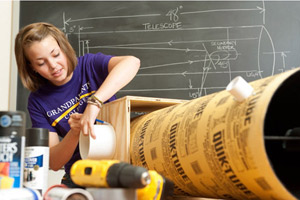Research Opportunities

Physics students can conduct research during the summer with Albion College faculty, or participate in off-campus research opportunities sponsored by the National Science Foundation, NASA and other facilities across the country, including national laboratories.
Some recent examples include SLAC (Stanford), Ames Laboratory, the National Renewable Engineering Lab, and the Mount Wilson Observatory.
Read about how Holly Farris’s, ’12, reflecting telescope project (right) through Albion’s Foundation for Undergraduate Research, Scholarship, and Creative Activity (FURSCA).
“Building a telescope from the inside out was eye-opening,” she said. “I can explain the advantages and disadvantages of different types of telescopes. I also learned how to be creative and innovative.”
Watch the video Dugan Karnazes, ’12, Laura Pollum, ’10, and Brandan Walters, ’10, worked as a team in the Physics 245 Electronics course during the spring semester to levitate a magnet using a synthetic electromagnetic field the students created.
The project was based on a junior- and senior-level systems control project at the Massachusetts Institute of Technology. Albion students took it a step further by introducing a function generator, which allows the operator to control how far the magnet levitates from the sensor.
Research at the Frontiers of Knowledge
Students may participate in the Oak Ridge Science Semester (ORSS) at Oak Ridge National Laboratory during the fall semester of their senior year. Oak Ridge National Laboratory (ORNL) is a U.S. Department of Energy (DOE) multiprogram laboratory focusing on national and global energy and environmental issues. The Laboratory is managed for DOE by Lockheed Martin Energy Research Corporation. ORNL’s mission is to conduct basic and applied research and development in order to advance the nation’s energy resources, environmental quality and scientific knowledge and to contribute to the educational foundation and national economic competitiveness.
The GLCA / ACM Oak Ridge Science Semester enables students to join ongoing investigations at ORNL and to use the sophisticated resources available at the Laboratory, including supercomputers and state-of-the-art electron microscopes, lasers and analytical instruments such as a Fourier Transform Mass Spectrometer and a scanning tunneling microscope.
The applications of accepted students are sent to one or more research groups whose interests are similar to those of the student. Students devote most of their time to research, with a scientist from the ORNL staff serving as a mentor.
In addition, students are required to participate in an interdisciplinary seminar and choose an advanced academic course from among a variety of options.
The academic program is enriched in informal ways by guest speakers, department colloquial and the special interests and expertise of the ORNL staff.